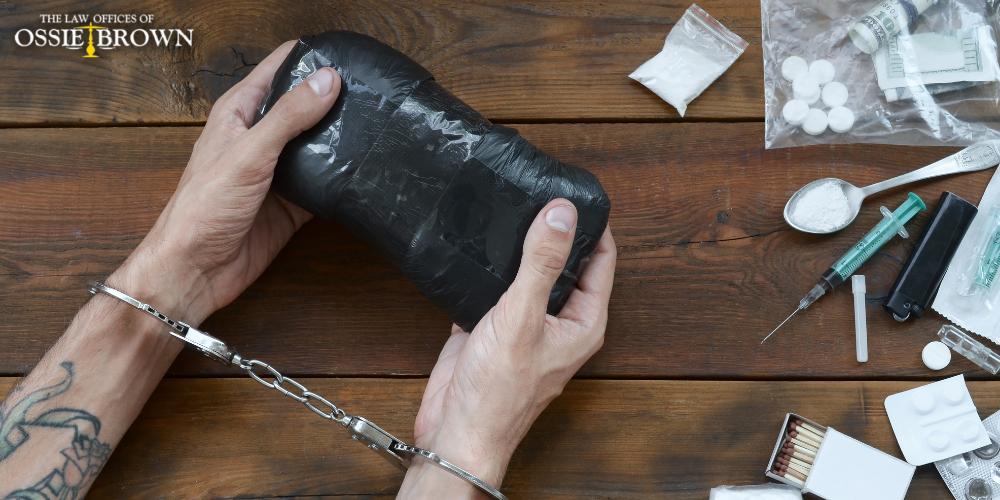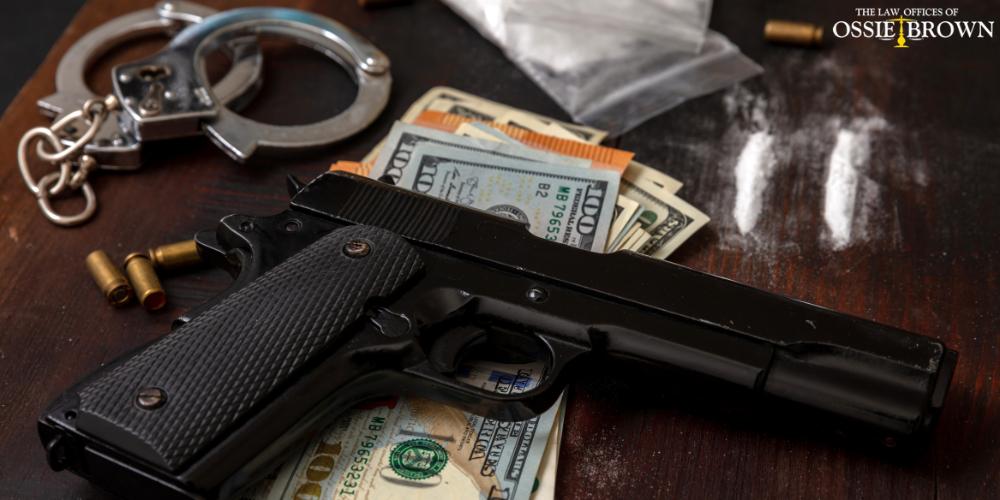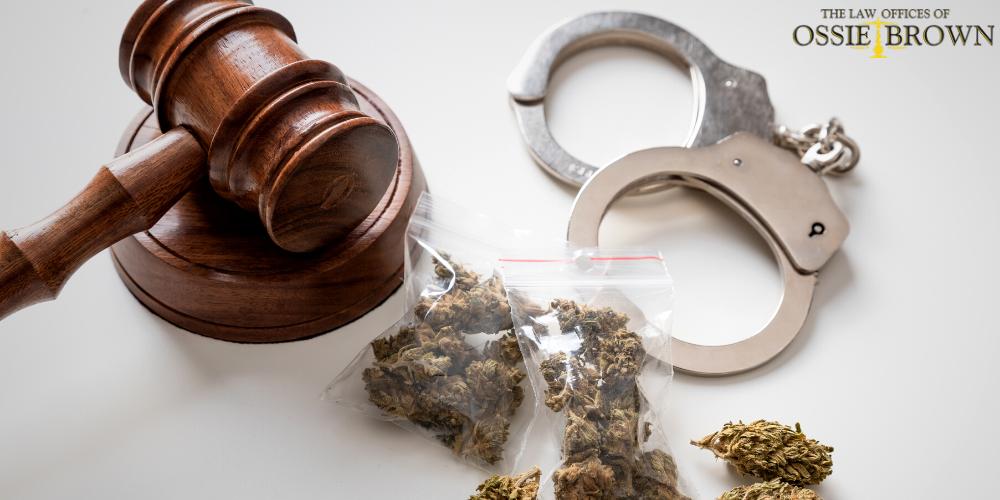Baton Rouge Drug Trafficking Attorney
Practice Areas
Drug trafficking is the cultivation, manufacture, possession, sale, and importation of illegal drugs on a national and international scale. It’s currently a multi-billion dollar a year industry that accounts for an estimated 1% of the global gross domestic product (GDP). The most commonly trafficked drugs today include methamphetamine, cocaine, heroin, fentanyl, and marijuana.
A drug trafficking conviction could result in severe penalties, such as upwards of 25 years in prison and hundreds of thousands of dollars in fines. Exact penalties depend on the type and weight of the drug involved, as well as specific state laws. Below, our Baton Rouge drug trafficking lawyers break down everything you need to know about this type of drug crime.
If you’re facing drug trafficking charges in the state of Louisiana, it’s important to arm yourself with the best possible legal representation. The legal team at the Law Offices of Ossie Brown have been handling all sorts of drug crime cases, including drug trafficking cases since 1984. You can rest assured that a Baton Rouge drug trafficking attorney will protect your legal rights, create a strong defense, and help you obtain the best case outcome possible. Call 225-343-1111 to schedule a free consultation at our law firm today.

What is Drug Trafficking?
Drug trafficking is a serious crime involving the cultivation, sale, manufacture, and distribution of illegal drugs across the globe. The most well-known drug trafficking routes can be found in:
- East and South Africa: Illegal drugs are transported from Afghanistan to Europe and America on this route.
- West Africa: Cocaine that’s manufactured in Bolivia and Columbia is transported through West African countries such as Ghana, Nigeria, and Cameroon.
- Asia: Illegal drugs mainly come from Afghanistan and travel through China, Central Asia, and Russia.
- Central and South America: Controlled substances most commonly come from Colombia and are distributed through Central America, Mexico, Haiti, and other countries in this area.
It should be no surprise that drug trafficking occurs on the internet as well, most commonly through what’s known as the “dark web.” The dark web platform called Silk Road distributed illegal drugs to more than 100,000 customers before the FBI shut it down in 2013. The site’s creator, Ross Ulbricht, is currently serving life imprisonment for his drug-related crimes. Similar sites, such as Silk Road 2.0, were also created and promptly shut down by the FBI.
Drug Distribution vs. Drug Smuggling vs. Drug Trafficking
Drug trafficking may sound very similar to other drug-related crimes, such as drug distribution and drug smuggling, but there are key differences.
Drug distribution involves the possession, sale, and movement of a controlled substance. You don’t have to actually collect money for drugs to be hit with this criminal charge. You just have to be caught possessing drugs and drug paraphernalia, which often indicates the intent to distribute. Drug distribution penalties depend on the type and amount of controlled substance being sold or moved.
If you’ve been charged with distribution, contact a Baton Rouge drug distribution lawyer.
Drug smuggling is another serious offense that involves the transportation of illegal drugs across state or country lines.
All of these drug crimes sound exactly the same, but they are different depending on a multitude of factors. Firstly, drug trafficking is different from drug distribution in that it’s determined by the weight of drugs, rather than the movement of drugs. Basically, if you’re caught possessing and/or moving drugs under a certain weight, you’ll likely face drug distribution charges, not drug trafficking charges. Meanwhile, drug trafficking differs from drug smuggling in that there must be the element of selling involved in the transport. If not, dealers will likely just face a smuggling charge.
Lastly, drug distribution and drug smuggling differ in that in the former charge, drugs are usually not transported over state or country lines, and in the latter, they are. Additionally, drug distribution often involves the sale of drugs, while again, drug smuggling doesn’t have to involve selling.
Drug Trafficking Statistics in the U.S.
According to the U.S. Sentencing Commission, more than 16,287 of the 64,565 cases reported in 2020 involved drug trafficking. The following types of illegal drugs accounted for 96.8% of all drug trafficking cases:
- Methamphetamine: 46.1%
- Powder Cocaine: 16.6%
- Heroin: 11.6%
- Crack Cocaine: 7.5%
- Marijuana: 6.9%
- Fentanyl: 6.3%
- Other: 3.2%
- Oxycodone: 1.8%
The Link Between Drug Trafficking and Violent Crime
Drug trafficking cases often involve other violent crimes that result in serious bodily injury or death. In fact, the FBI estimates that about 5% of all U.S. murders in the late 1990s were drug-related.
This may come as no surprise because this industry is very dangerous, and drug traffickers have a lot at stake: thousands of dollars, expensive and illegal controlled substances, and the wellbeing of their families – not to mention the possibility of serving life imprisonment. It’s very common for monetary or drug theft to occur during the trafficking process, leading drug traffickers to kill the thief to get back what’s theirs.
If you’ve been charged with violent crimes in relation to other drug crimes, contact our Baton Rouge violent crimes defense lawyers.

Elements of a Drug Trafficking Charge
There are many elements that make up a drug trafficking charge including intent and possession, the weight of drugs, and whether or not there was sale, manufacture, or movement involved. Law enforcement officers must have clear and convincing evidence of all of these elements, or the accused cannot be found guilty of drug trafficking. Instead, they may be found guilty of other charges, such as drug distribution or drug smuggling, as detailed previously.
Firstly, police and investigators must prove that the suspect intentionally possessed the drugs. For example, if an illegal drug was planted on your person or your property without your knowledge, then you could not be convicted of drug trafficking, because you are not intentionally possessing it.
Additionally, police must prove that you had the intent to distribute the illegal drug you possessed. Usually, intent to distribute is proven by large quantities of drugs the suspect has, as well as possession of drug paraphernalia and large amounts of cash. If a person possesses way more drugs than they could consume on their own, this alone could indicate intent to distribute.
Possibly the most important element that drug trafficking charges hinge on is the weight of drugs someone possesses. Specific weight amounts depend on the type of drug and the state law. In Louisiana, a person who possesses more than 2.5 pounds of marijuana or more than 14 grams of heroin and/or narcotics could potentially face drug trafficking charges.
The next element in a drug trafficking charge is proving that the suspect facilitated or was involved in the sale, manufacture, and/or movement of the drugs. But this matters less than the weight of the drugs in a suspect’s possession.
Drug trafficking that occurs only within state lines can be handled by the state government. However, if there is substantial evidence to prove that a suspect was manufacturing, selling, and/or moving drugs across state or country lines, the federal government will get involved in prosecution.
Drug Trafficking Penalties in Louisiana
Because this is a felony offense, state and federal drug trafficking charges can lead to serious penalties. The mandatory minimum sentence and fine will heavily depend on the type and weight of the drug involved in the trafficking. Additionally, each state issues different prison sentences for these types of drug crimes.
In Louisiana, you could spend up to 20 years in prison and owe up to $500,000 in fines if you’re convicted of drug trafficking. Large quantities of cocaine, heroin, and hydrocodone will result in the most severe penalties in our state.
It’s important to note that if you have committed some kind of violent crime, such as homicide or aggravated assault, alongside your drug crime, then you will receive even harsher penalties. This is the reality for many drug traffickers who wind up in violent situations.
If you’re a Louisiana resident but you’ve been trafficking drugs to other states or countries, you will likely be tried in federal court and receive even harsher penalties, such as life imprisonment. An experienced drug trafficking attorney at the Law Offices of Ossie Brown can carefully analyze the details of your case, give you a rough idea of your penalties, and help you build an aggressive defense.
Contact a Baton Rouge drug possession lawyer for more information.
Possible Drug Trafficking Defenses
An aggressive defense may not clear your name and your criminal record, but it can certainly reduce your mandatory minimum sentence and fine. Baton Rouge drug trafficking lawyers at the Law Offices of Ossie Brown may be able to use the following defenses in your favor:
- Entrapment: What is entrapment? Our drug trafficking lawyers may be able to prove that an undercover police officer framed you or induced you to commit drug trafficking. Entrapment is illegal in the United States, so if this happened to you, your charges could be completely dropped.
- Illegal Search and Seizure: Police officers must obtain a search warrant in order to search someone’s property. And in order to obtain a search warrant, police officers must have probable cause. Without probable cause and a search warrant, searching someone’s property is illegal, even if drugs happened to be found in the process. This defense may decrease a suspect’s prison sentence and fine.
- Weight of Drugs: Again, the weight of drugs a person possesses is the most important element in a drug trafficking charge. If you did not possess the minimum weight of drugs to warrant a drug trafficking charge, then your charge could be substantially downgraded to something else, like drug possession and/or distribution.

Call a Baton Rouge Drug Trafficking Lawyer at the Law Offices of Ossie Brown Today
If you are facing drug trafficking charges in Louisiana, your life and reputation hinges on hiring strong legal representation. A Baton Rouge criminal defense lawyer from the Law Offices of Ossie Brown can analyze the details of your case, protect your legal rights, and help you create an aggressive defense. Our legal team has decades of combined experience in handling all sorts of drug-related cases, including drug trafficking cases.
Our drug trafficking lawyers are the best team to have on your side during such stressful circumstances. Call 225-343-1111 to schedule a free consultation at our law firm today.
Free Consultation
Let us review your case at no cost to you. We want to take the time to get to know you and understand your legal goals and objectives.
Why Our Clients Trust Us
Your Law Firm for a Lifetime.
The attorneys at The Law Offices of Ossie Brown are skilled in several practice areas and ready to discuss your case. Contact us today to schedule your free consultation.

